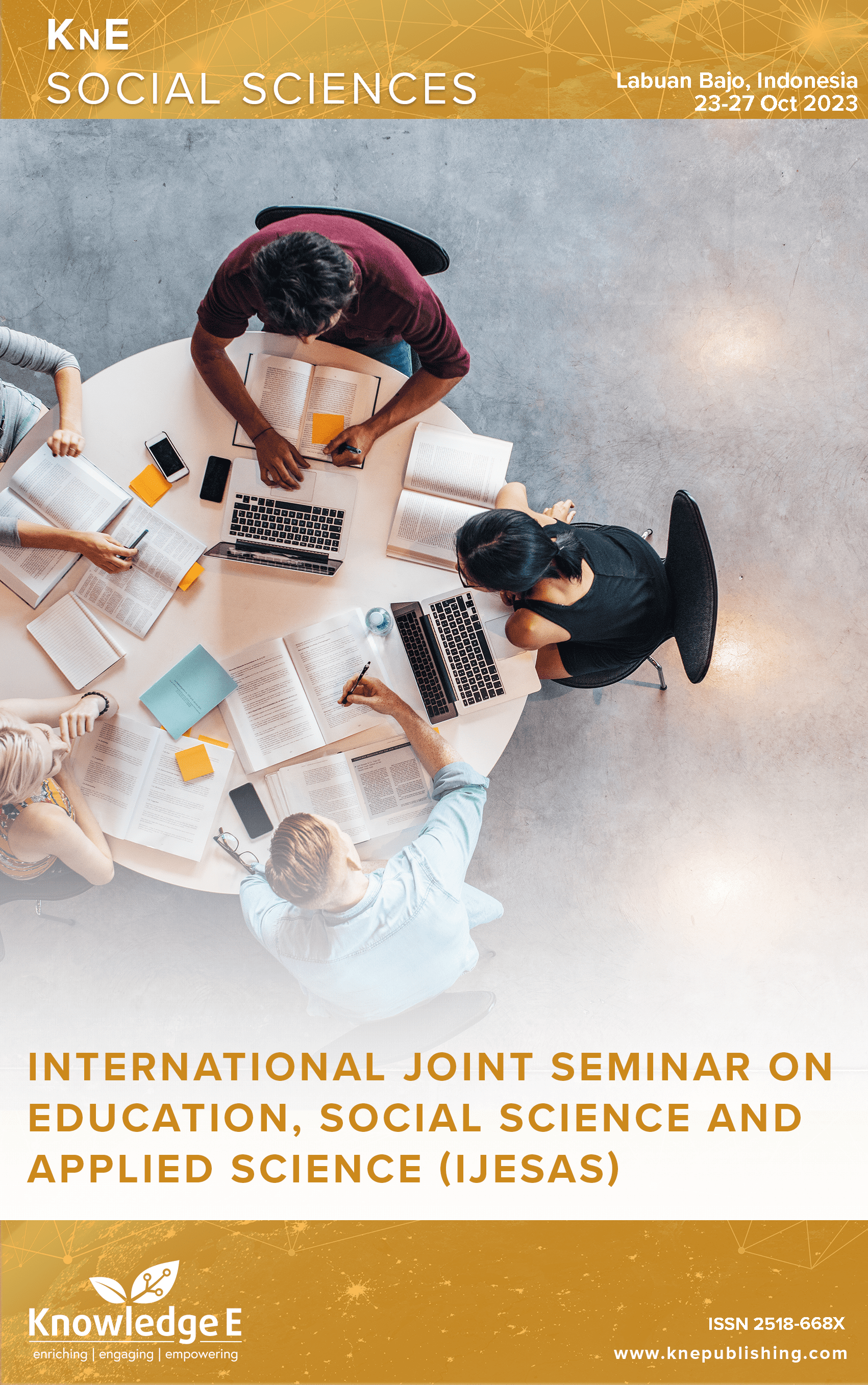Reconstruct Local Potential as Learning Resources to Support Science Learning
DOI:
https://doi.org/10.18502/kss.v9i19.16543Abstract
This research aims to reconstruct the scientific knowledge that exists in the local natural tourism potential of Ledok Sambi and Code River. It is hoped that this research will be able to add references for teachers and developers of junior high school science learning, to utilize the local potential that exists in the environment around the school as a context for science learning. This research is exploratory research which is used to examine an interesting object. This study explores the local potential close to the school area as a learning resource. The local potential that is the object of study is in Yogyakarta Province, namely, Ledok Sambi and Code River tourism. Data collection was carried out using direct observation and interview techniques. Interviews were conducted with managers, visitors, and the community around tourist attractions. The results of the observations show that the material that might be used as a learning resource from Ledok Sambi and Sungai Code is related to ecosystems and pollution. The implication of this research is to develop science teaching materials. Apart from that researchers can also conduct direct research regarding the pollution level of the Code River and the benefits of Ledok Sambi natural tourism in education.
Keywords: assessment, conceptual framework, design thinking, teacher education
References
Marudut MR, Bachtiar IG, Kadir K, Iasha V. “Peningkatan Kemampuan Berpikir Kritis dalam Pembelajaran IPA melalui Pendekatan Keterampilan Proses.” Jurnal Basicedu. vol. 4, no. 3 SE-Articles, pp. 577–585, 2020. https://doi.org/10.31004/basicedu.v4i3.401. DOI: https://doi.org/10.31004/basicedu.v4i3.401
Imaroh RD, Sudarti S, Handayani RD. “Analisis Korelasi Kemampuan Berpikir Kreatif dengan Model Problem Based Learning (PBL) pada Pembelajaran IPA.” JURNAL PENDIDIKAN MIPA. vol. 12, no. 2 SE-Articles, p. 2022.
Sukardiyono D, Rosana D, Dwandaru WS. “Measuring junior high school students’ science learning and science process skills through an integrated science instructional assessment”. Journal of Turkish Science Education. 2020;16(4):467–77. DOI: https://doi.org/10.36681/tused.2020.1
Uge S, Neolaka A, Yasin M. Development of social studies learning model based on local wisdom in improving students’ knowledge and social attitude. Int J Instr. 2019;12(3):375–88. DOI: https://doi.org/10.29333/iji.2019.12323a
Tyas RA, Wilujeng I, Suyanta S. Pengaruh pembelajaran IPA berbasis discovery learning terintegrasi jajanan lokal daerah terhadap keterampilan proses sains. Jurnal Inovasi Pendidikan IPA. 2020;6(1):114–25. DOI: https://doi.org/10.21831/jipi.v6i1.28459
Purwasih D, Wilujeng I. Analysis ecological literacy skill through implementation of learning instruction based on local potential ‘Pulau Kembang’. Asian Journal of Science Education. 2023;5(2):12–9. DOI: https://doi.org/10.24815/ajse.v5i2.31512
Yustina WS, Vebrianto R. The effects of blended learning and project-based learning on pre-service biology teachers’ creative thinking skills through online learning in the COVID-19 pandemic. Jurnal Pendidikan IPA Indonesia. 2020;9(3):408–20. DOI: https://doi.org/10.15294/jpii.v9i3.24706
Misbah M, Purwasih D, Muhammad N, et al. “Is science concept can analyze by study ethnoscience? Study bibliometric and analysis.” In: AIP Conference Proceedings. AIP Publishing (2024). https://doi.org/10.1063/5.0201390. DOI: https://doi.org/10.1063/5.0201390
Irhasyuarna Y, Kusasi M, Fahmi F, Fajeriadi H, Aulia WR, Nikmah S, et al. Integrated science teaching materials with local wisdom insights to improve students’ critical thinking ability. BIO-INOVED : Jurnal Biologi-Inovasi Pendidikan. 2022;4(3):328. DOI: https://doi.org/10.20527/bino.v4i3.14148
Bulkani M, Fatchurahman M, Adella H, Setiawan MA. “Development of animation learning media based on local wisdom to improve student learning outcomes in elementary schools.” Int J Instr. 2022;15(1):55–72. DOI: https://doi.org/10.29333/iji.2022.1514a
Zulfiani IP, Sumantri MF. Science adaptive assessment tool: kolb’s learning style profile and student’s higher order thinking skill level. Jurnal Pendidikan IPA Indonesia. 2020;9(2):194–207. DOI: https://doi.org/10.15294/jpii.v9i2.23840
Putri AS, Aznam N. The effect of the science web module integrated on Batik’s local potential towards students’ critical thinking and problem solving (Thinking Skill). Journal of Science Learning. 2019;2(3):92–6. DOI: https://doi.org/10.17509/jsl.v2i3.16843
Ri.A. Tyas, W.M. Nisa, J. Febriandini, I. Wilujeng, and Suyanta, “Integrating Cangkringan’s Local Potential in Science Education Through Subject Specific Pedagogy: Is It Really Integrated?”. Indonesian Journal of Science and Education. 2021;01(05):35–43. DOI: https://doi.org/10.31002/ijose.v5i1.3471
Creswell JW. Educational research: Planning, conducting, and evvaluaating quantitative and qualitative research. Pearson Education, Inc. Ner Jersey; 2008.
Mulyadi A, Efriyeld R. Hamidy, Nofrizal. “Development of mangrove ecotourism in Bandar Bakau Dumai Based on Disaster Mitigation.” Int J Sustain Dev Plan. 2021;16(7):1359–67. DOI: https://doi.org/10.18280/ijsdp.160716
Jufrida FR, Destinanda A. Analisis dan Integrasi Kearifan Lokal Lubuk Larangan Tantang Sakti dalam Pembelajaran Sains. Edufisika: Jurnal Pendidikan Fisika. 2020;5(1):32–8. DOI: https://doi.org/10.22437/edufisika.v5i01.9583
Zangori L, Ke L, Sadler TD, Peel A. Exploring primary students causal reasoning about ecosystems. Int J Sci Educ. 2020;42(11):1799–817. DOI: https://doi.org/10.1080/09500693.2020.1783718
D. Purwasih and I. Wilujeng, “The local potential of” Kembang Island”: A contextual study in science learning.” Vidya Karya. vol. 38, no. 1, pp. 34–42,. DOI: https://doi.org/10.20527/jvk.v38i1.16104
Purwasih D, Wilujeng I, Jumadi J, Wahyuni T. “Development of E-modules based on learning style to facilitate study during pandemic.” ACM International Conference Proceeding Series. pp. 53–58, 2022.
Purwasih D, Wilujeng I, Jumadi J, Wahyuni T. “Development of E-modules based on learning style to facilitate study during pandemic.” In: 2022 13th International Conference on E-Education, E-Business, E-Management, and E-Learning (IC4E). pp. 53–58 (2022). https://doi.org/10.1145/3514262.3514277. DOI: https://doi.org/10.1145/3514262.3514277
Wahyuni T, Purwasih D, Syaukani MH. “Scientific approach based E-Module on vibration, waves, and sound using canva design.” Journal of Education Technology. vol. 6, no. 3, p. 2022. https://doi.org/10.23887/jet.v6i3.36133. DOI: https://doi.org/10.23887/jet.v6i3.36133
Purwasih D, Wilujeng I, Membalik V, Hasan S. “Learning Instructional using Webbed Models based on Local Potential” Pulau Kembang” to Enhance Ecological Literacy Skill,” Jurnal Inovasi Pendidikan IPA. vol. 8, no. 2, p. 2022. DOI: https://doi.org/10.21831/jipi.v8i2.49288

